Iran briefly closes western airspace for military drills
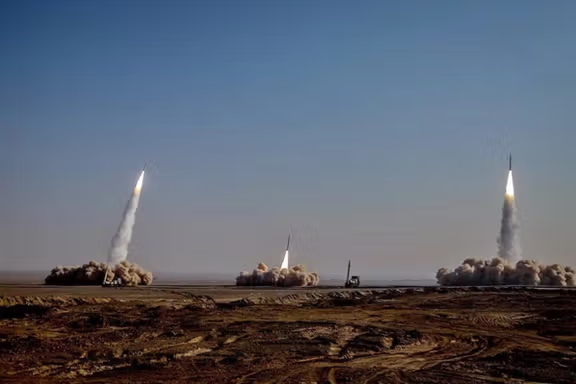
Iran temporarily closed large sections of its western airspace early on Friday to allow military drills, before restoring flights several hours later, local media reported.

Iran temporarily closed large sections of its western airspace early on Friday to allow military drills, before restoring flights several hours later, local media reported.
Fars News Agency said the restrictions were imposed from midnight until 6 a.m. local time, covering parts of Zanjan, Hamedan, Arak, Yasuj, Iran’s western borders, and airspace over the western Persian Gulf.
Several domestic outlets reported that the exercise was carried out by the Islamic Revolutionary Guard Corps (IRGC) and involved both missile and drone operations across several regions.
The move came as regional media reported heightened security. Al-Hadath television said two planes — one Iraqi and one Iranian — due to depart Baghdad for Tehran were prevented from taking off during the restrictions. No official explanation was given.
Iran has issued separate notices to airmen (NOTAMs) in recent weeks closing parts of eastern provinces, including North, Razavi and South Khorasan, for live-fire drills until the end of summer.
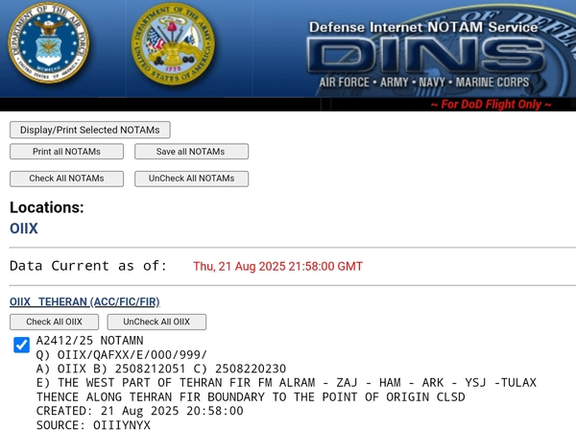
Earlier this week, Iran’s navy test-fired Nasir, Qadir, and Ghader cruise missiles during large-scale drills in the Gulf of Oman and northern Indian Ocean, state media said.
The exercises, called Sustainable Power 1404, involved launches from coastal batteries and warships including the Genaveh missile boat and Sabalan destroyer. Officials said the radar-evading, high-precision missiles struck their targets at sea.
The drills came a month after joint Iran-Russia naval maneuvers in the Caspian Sea -- Casarex 2025.
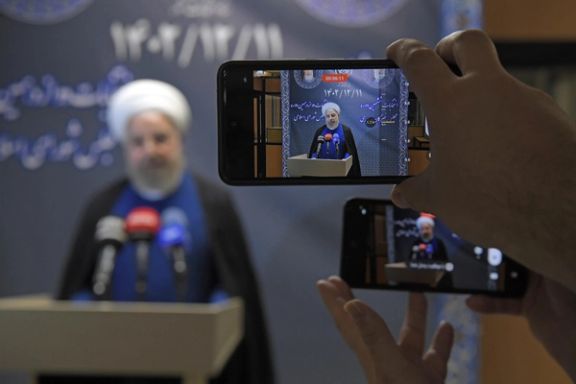
A prominent Iranian conservative figure alleged that Israel seeks to orchestrate leadership change in Tehran by assassinating members of the Assembly of Experts to pave the way for former president Hassan Rouhani, Iranian media reported on Thursday.
Mohammad-Hassan Ghadiri Abyaneh, Iran’s former envoy to Australia, said: “The assassination of members of the Assembly of Experts is part of Israel’s plan, and the individual favored by the enemies to head the system is Hassan Rouhani.”
The Assembly of Experts is an 88-member clerical body empowered to appoint Iran’s Supreme Leader. Its members, elected for eight-year terms, are chosen from candidates vetted by the Guardian Council, whose members are themselves appointed directly or indirectly by the Supreme Leader.
Abyaneh added, “They want to put someone like Rouhani at the top of the system in order to fragment Iran, and the fragmentation of Iran is among Rouhani’s goals.”
He also accused reformist politician Behzad Nabavi of advising President Masoud Pezeshkian to disrupt the economy deliberately to create leverage for negotiations with the United States.
He did not present any evidence for his claims.
His comments come as Rouhani and Iran’s Reform Front have urged sweeping political and foreign policy changes, including a temporary suspension of uranium enrichment, release of political prisoners, and direct negotiations with Washington in return for sanctions relief.
Rouhani said earlier in the month, “There is no way to save the country except for all of us to become servants of the people — to recognize that sovereignty belongs to the people.”
The reformist push has drawn fierce backlash from conservatives, with some likening it to a 2003 reformist manifesto that ended in arrests and bans.
Tasnim, an outlet linked to Iran’s Guards, warned that reformists’ calls for sweeping policy changes resembled a “Gorbachev moment,” arguing such concessions to foreign narratives risk weakening national interests and repeating mistakes that led to the Soviet Union’s collapse.
European powers have warned that unless Tehran resumes nuclear talks by the end of August, they are prepared to trigger the UN’s sanctions “snapback” mechanism, which could restore Security Council penalties.
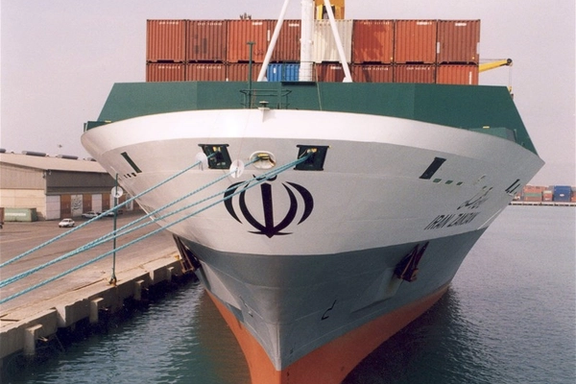
A hacker group said it disabled communications on more than 60 Iranian oil tankers and cargo ships, severing links between the vessels, their ports, and the outside world in one of the largest cyberattacks on the country’s maritime sector.
The group, known as Lab-Dookhtegan (Sewn Lips), told Iran International that it hacked into the systems of the National Iranian Tanker Company (NITC) and the Islamic Republic of Iran Shipping Lines (IRISL), disrupting operations on 39 tankers and 25 cargo ships.
The hackers said the breach was carried out by infiltrating Fanava Group, an Iranian IT and telecoms holding company that provides satellite communications, data storage, and payment systems.
They said they obtained “root-level” access to the Linux operating systems running the ships’ satellite terminals, enabling them to stop Falcon, the control software at the heart of Iran’s maritime communications.
Stopping Falcon means complete disconnection between the ships and shore, the group said, adding that the hack rendered automatic identification system (AIS) tracking and satellite links inoperable.
NITC and IRISL targeted
The two state-linked companies are central to Iran’s sanctioned economy.
NITC, a subsidiary of the National Iranian Oil Company, is one of the Middle East’s largest tanker fleets with more than 46 vessels and a total annual capacity of 11 million tons. Its tankers, such as the Amber, Apama, Deep Sea, Fortune and Faxon, transport Iranian crude globally, often switching off tracking systems to evade sanctions.
IRISL, with a fleet of about 115 vessels, is Iran’s largest cargo operator and ranked the world’s 14th biggest shipping line by Alphaliner in 2022. Its ships, including Abyan, Avang, Parisan, Radin and Touska, have been sanctioned by the US, EU and UN for their role in supporting Iran’s nuclear and missile programs.
Both companies were sanctioned by the US Treasury in 2020 for aiding the Islamic Revolutionary Guard Corps’ Quds Force, the extraterrestrial wing of the IRGC.
This is not the first time Iranian shipping has been targeted. In March 2025, Lab-Dookhtegansaid it disrupted the communications of 116 vessels belonging to the same two firms. At the time, the group claimed the attack was timed to coincide with US operations against Iran-backed Houthis in Yemen.
US and European sanctions have already limited Iran’s access to advanced maritime technology, insurance, and international ports, leaving the fleets more exposed to cyber and physical threats.
Fanava Group, founded in 2003 and headquartered in Tehran, has yet to respond to requests for comment.
The cyberattack comes as Iran faces growing scrutiny of its shipping and oil-export networks. Western governments accuse Tehran of using its maritime fleet to mask oil sales to China and others, while also supplying weapons to proxy groups including Hezbollah and Yemen’s Houthis.
In the latest effort to stop Tehran's oil exports, the US sanctioned 13 companies and eight vessels over suspected ties to Iran, the Treasury Department said on Thursday.
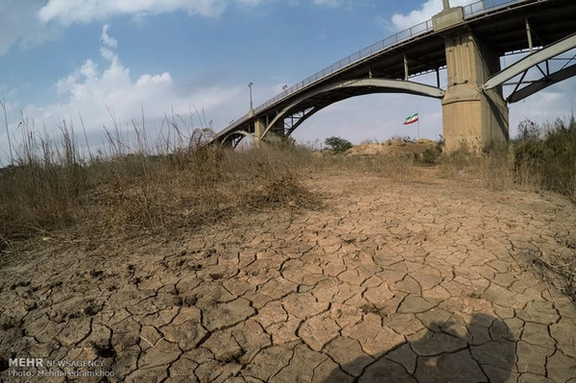
The Karun River, the longest and only navigable river in Iran, is under severe strain from drought, reduced flow, chemical pollution, and wetland degradation, according to experts.
The river, a key source of hydropower through dams such as Karun 3, Karun 4, and Gotvand, has seen its water levels fall sharply.
Experts have long criticized Iran’s dam-building policy as unsustainable, driven by poor governance and short-term political interests rather than scientific planning.
“The most significant factors in the Karun crisis are dam construction projects like Karun and Gotvand, inter-basin water transfers to provinces such as Isfahan and Yazd, and the cultivation of water-intensive crops like sugarcane and rice in Khuzestan,” Ali Arvahi, a wetland ecosystem management expert, told the news outlet Khabar Online on Thursday.
Karun 3 and Gotvand dams are located in Khuzestan Province, while Karun 4 is in Chaharmahal and Bakhtiari.
“In recent years, the Karun’s flow, once 500 to 600 cubic meters per second, has fallen to below 100 cubic meters per second in some months,” Arvahi noted.
Water crisis, air pollution
Khuzestan, a major hub for sugarcane cultivation, has more than 80,000 hectares under the crop despite an ongoing water crisis.
“Sugarcane farming in Khuzestan’s semi-arid climate is neither sustainable nor economically viable in the long run. It is among the biggest planning mistakes in the Karun basin, putting extreme pressure on limited water resources,” Arvahi said.
The province also suffers some of the highest air pollution levels in Iran.
On Thursday, Iran’s Air Quality Monitoring System reported unhealthy (red-level) conditions in multiple cities of Khuzestan: Ahvaz (AQI 168), Hendijan (167), Behbahan (163), Ramhormoz (156), and Andimeshk and Omidiyeh (155).
The safe (green) range on the Air Quality Index (AQI) is 0–50, while anything above 100 is considered unhealthy, especially for sensitive groups.
Broader climate crisis
Amid an ongoing economic crisis, Iran is currently grappling with multiple national challenges including severe water shortages and widespread power outages which are also hampering the country's agricultural industry.
“The situation we are witnessing now is complete water bankruptcy across most of the country, resulting from mismanagement. When they could have prevented these issues, they paid no attention,” Mansour Sohrabi, an ecologist and environmental expert in Cologne, told Iran International.
Over the past year, Iran has recorded a 1.5°C rise in average temperatures and a 45% decline in rainfall, contributing to accelerating desertification nationwide.
The Karun River is the longest in Iran, stretching 950 kilometers (590 miles) from the Zagros Mountains through Khuzestan Province to the Persian Gulf.
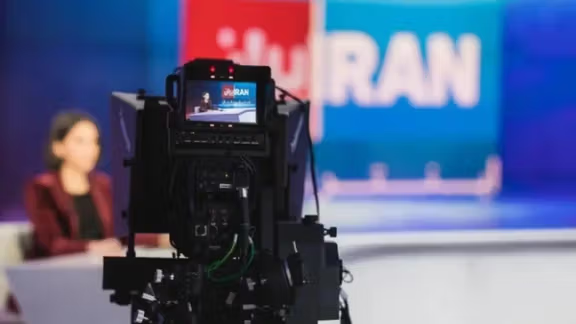
UN human rights experts on Thursday condemned what they called Iran’s intensifying campaign of repression against journalists working for Iran International and the intimidation of their families, particularly after the 12-day war with Israel.
“We are deeply concerned by credible threats to the lives and safety of 45 Iran International journalists and staff and 315 of their family members,” the experts said in a joint statement.
The statement comes after Iran International filed an urgent appeal earlier this month with the experts urging them to take action against Iran over serious risks to the lives and safety of their journalists worldwide and relatives inside Iran.
UN experts said several UK-based journalists have required police protection, with some forced to move into safe houses or relocate abroad.
"Reports suggest that journalists have been followed, had tracking tags attached to their cars, and their cars repeatedly broken into. Women journalists have faced threats of death and sexual violence on social media and instant messaging services, some receiving hundreds of messages a day."
The experts which included UN Special Rapporteur on the situation of human rights in Iran, Mai Sato, said the latest phase of repression had increasingly targeted family members in Iran, who have been interrogated, placed under surveillance, and threatened with arrest or death.
Interrogators allegedly demanded that relatives pressure journalists to quit Iran International or serve as informants, particularly concerning alleged ties to Israel, the statement said.
“This campaign is an attempt to silence and censor critical reporting and courageous public interest journalism by a fragile Government that appears afraid of legitimate criticism."
“Such intimidation violates both freedom of expression and media freedom and may have a chilling effect on other journalists. It also deprives the public of their right to information. Civic space in Iran is already severely limited, and transnational repression further impedes those seeking to expose human rights violations,” they added.
The UN experts urged Iran to “immediately stop threatening and intimidating journalists and their families” and to investigate all such threats, prosecute those responsible, including state officials, and prevent future violations.
Iran International is an independent Persian-language satellite TV news channel broadcasting live 24/7 from London and Washington DC.
The network started in 2017 and has become the most watched Persian-language TV channel within and outside Iran on both satellite and online platforms.
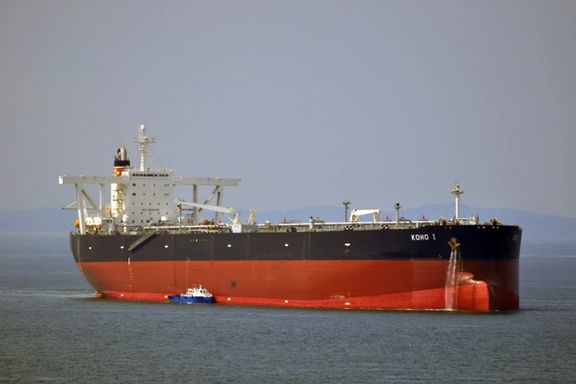
The United States imposed sanctions on 13 companies and eight vessels over suspected ties to Iran, the Treasury Department said on Thursday, in the latest effort to stop Tehran's oil exports in violation of US sanctions.
The designations target Greek national Antonios Margaritis and his network of companies, including Marant Shipping and Trading, Square Tanker Management, Comford Management and United Chartering, which Washington said had facilitated Iranian petroleum shipments for years.
“Today’s action against Margaritis and his network degrades Tehran’s ability to fund its advanced weapons programs, support terrorist groups, and threaten the safety of our troops and our allies,” Secretary of the Treasury Scott Bessent said in a statement.
"He (Antonios Margaritis) has most recently been involved in the operations of OFAC-sanctioned vessel MS ENOLA and MS ANGIA, which has carried Iranian oil," the Treasury said.
“Treasury remains determined to hold accountable all those who seek to aid the Iranian regime and threaten global security," he added.
The companies sanctioned on Thursday are based in Hong Kong, China, the United Arab Emirates and the Marshall Islands, according to the Treasury.
The Treasury accused Changbai Glory Shipping of moving more than four million barrels of Iranian oil to China on the LAFIT since March, Regal Liberty of delivering about two million barrels on the GIANT, and U Beacon Shipping of transporting over a million barrels on the ADELINE G.
It also accused Hong Kong Hangshun Shipping of shipping millions of barrels on the KONGM, and Ares Shipping of moving nearly ten million barrels on the ARES, often via ship-to-ship transfers with already sanctioned tankers.
UAE-based Ozarka Shipping was also sanctioned for managing vessels that transported Iranian petroleum products to China, while additional Hong Kong firms, including U Beacon Shipping, Hong Kong Hangshun Shipping and Ares Shipping, were sanctioned for their role in moving Iranian oil.